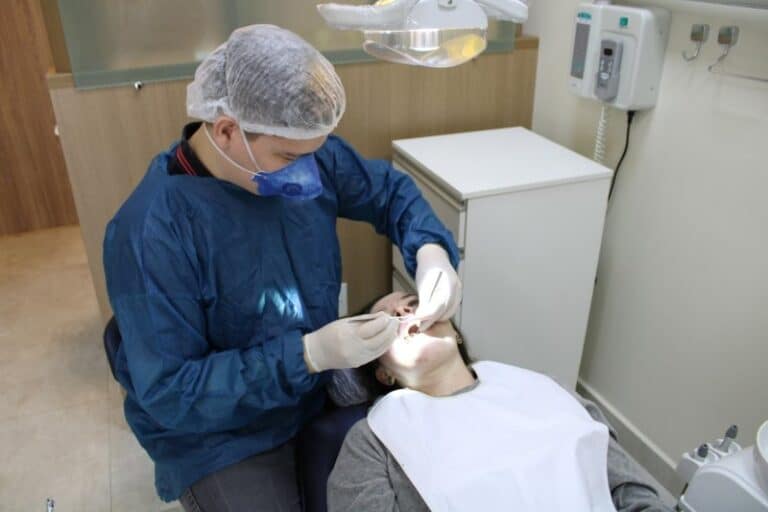- 14631 Lee Hwy STE 201, Centreville, VA 20121
- (703) 890-3200
Centreville Root Canal Therapy
-
Total Dental Arts > Centreville Root Canal Therapy
Centreville Root Canal Therapy
Root Canal Therapy at Total Dental Arts

If you’re experiencing tooth pain or sensitivity that won’t go away, it could be due to an infected tooth pulp. Root canal therapy is often the best solution to save your natural tooth and avoid extraction. At Total Dental Arts, located in Centreville, Dr. Kourosh and his team are committed to providing high-quality root canal therapy that is as comfortable and stress-free as possible. Our goal is to relieve pain, restore your smile, and help you maintain optimal oral health.
What Is Root Canal Therapy?
Root canal therapy is a procedure designed to treat infections that affect the pulp inside a tooth. The pulp is the soft tissue at the center of the tooth, containing nerves and blood vessels. When the pulp becomes infected or inflamed due to a cavity, crack, or physical trauma, it can cause significant pain and discomfort. Root canal therapy involves removing the infected tissue, cleaning and disinfecting the space, and sealing the tooth to prevent future infection.
While root canal therapy may sound intimidating, it’s actually a safe and effective way to save your tooth and alleviate pain. At Total Dental Arts, we use the latest dental technologies to ensure your procedure is as efficient and painless as possible.
When Do You Need a Root Canal?
There are several signs that indicate you might need a root canal. These include:
- Persistent tooth pain that is often deep and throbbing.
- Sensitivity to hot or cold that lingers after the stimulus is removed.
- Swelling or tenderness in the gums near the affected tooth.
- A pimple or abscess on the gums, which can indicate infection.
- Discoloration of the affected tooth.
- Pain while chewing or applying pressure to the tooth.
If you’re experiencing any of these symptoms, it’s important to consult with a dentist as soon as possible. Left untreated, an infected tooth can lead to more serious health problems, including the spread of infection to other areas of the body.
The Benefits of Root Canal Therapy
Root canal therapy is an excellent option for saving a damaged or infected tooth. Without treatment, the infection may spread to surrounding teeth or even your jawbone, leading to tooth loss. In some cases, the infection can cause systemic health issues if left untreated. The benefits of choosing root canal therapy over tooth extraction include:
- Preserving your natural tooth, which maintains the structure of your bite and alignment.
- Relieving pain caused by infection or damage to the tooth pulp.
- Preventing the need for more expensive treatments, such as dental implants or bridges.
The Total Dental Arts team ensures that you understand the process every step of the way so you can feel confident and informed.
What to Expect Before and During Your Root Canal Procedure
Before starting root canal therapy, we will perform a comprehensive dental exam to assess the extent of the infection and take X-rays to view the tooth and surrounding tissues. Our goal is to determine whether root canal therapy is the best option or if other treatments might be necessary.
On the day of the procedure, we will begin by numbing the affected area with local anesthesia. Dr. Kourosh will then create a small opening in the tooth to access the infected pulp. The infected tissue will be carefully removed, and the chamber will be cleaned and disinfected to eliminate any remaining bacteria. After that, the tooth will be sealed to prevent future infection.
If necessary, a temporary filling will be placed in the tooth until a permanent restoration, such as a crown, is placed.
What to Expect After a Root Canal Treatment
After your procedure, you may experience mild discomfort or sensitivity, especially when chewing or touching the tooth. This discomfort is usually temporary and can be managed with over-the-counter pain relievers like Tylenol or Advil. Most people experience minimal pain after the first few days.
It’s essential to follow any aftercare instructions provided by Dr. Kourosh to avoid complications and ensure a smooth recovery. For example, you should avoid chewing on the treated tooth until the permanent restoration is placed. Eating hard or crunchy foods too soon can cause the tooth to fracture.
You should also make sure to attend any follow-up appointments scheduled to ensure your tooth is healing properly and to address any concerns you may have.
Possible Complications of Root Canal Therapy
Although rare, complications can occur following root canal therapy. These may include:
- Infection or reinfection of the tooth.
- Fracturing of the tooth if it is not adequately protected with a crown.
- Persistent pain or swelling that does not improve with over-the-counter pain medication.
If you notice any of these symptoms after your procedure, it’s important to contact us immediately. Early intervention can help prevent further complications and ensure a successful recovery.
Schedule Your Root Canal Consultation in Centreville, VA
If you’re experiencing signs of a tooth infection or have been told you need a root canal, don’t wait. Call (703) 890-3200 today to schedule a consultation with Dr. Kourosh and the team at Total Dental Arts. We will carefully examine your condition, provide a detailed treatment plan, and help you make an informed decision about your dental care.
